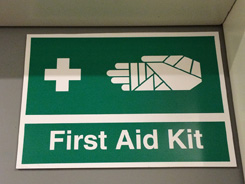
In the workplace, BBP may be transmitted when blood or other infectious body fluids come in contact with mucous membranes (eyes, nose, mouth); non-intact skin (due to cuts, abrasions, burns, rashes, paper cuts); or by handling or touching contaminated materials or surfaces. BBP are also transmitted by “injection” under the skin via a contaminated sharp object puncturing or cutting the skin causing a wound.
Hepatitis B Virus vs. Human Immunodeficiency Virus
HBV virus is more persistent than HIV and is able to survive for at least one week in dried blood on environmental surfaces. However; HIV will not survive for more than a few minutes when exposed to room temperature air, and will usually die within seconds.
HBV can be prevented with a vaccine. At the present time there is no preventative vaccine for HIV.
When Administering First Aid:
- Always wear gloves or protective equipment (Such as nitrile or latex gloves or, a plastic bag).
- IMMEDIATELY wash your hands and affected areas with soap and water.
- Clean affected work areas with water and household bleach (10:1)
- Never administer First Aid or clean an affected are, without protecting yourself and those around you!
